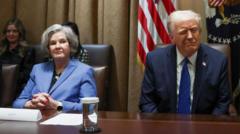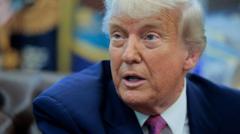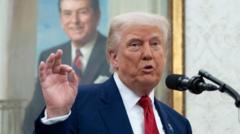In a groundbreaking ruling, a U.S. federal court has impeded President Trump's significant tariffs, marking a significant setback to his economic initiatives.
US Trade Court Overturns Trump's Tariffs: A Setback for Economic Strategy

US Trade Court Overturns Trump's Tariffs: A Setback for Economic Strategy
Federal judges challenge presidential authority over trade policies, highlighting constitutional limits.
A U.S. federal court has unexpectedly blocked President Donald Trump's extensive tariffs, delivering a substantial setback to one of his administration's central economic strategies. The Court of International Trade stated that the emergency powers invoked by the White House did not grant the president broad authority to impose tariffs across nearly all trading partners. The Manhattan-based court emphasized that the U.S. Constitution aligns the exclusive power to regulate foreign commerce with Congress, thereby limiting the president's ability to safeguard the economy alone.
In response to the quick ruling, the Trump administration promptly filed an appeal. This judgment also annulled separate tariffs imposed on China, Mexico, and Canada to counteract what the administration deemed as an unacceptable influx of drugs and illegal immigration into the United States. "It is not for unelected judges to dictate national emergency responses," argued White House deputy press secretary Kush Desai.
Trump had vowed to prioritize American interests, and Desai reiterated the administration's commitment to leveraging all executive powers to tackle what they perceive as looming crises. The lawsuit was initiated by the Liberty Justice Center on behalf of five small businesses negatively impacted by the tariffs. New York's attorney general, Letitia James, hailed the ruling, underscoring that no president has unchecked authority to raise taxes at will.
James criticized the tariffs as a heavy financial burden on American businesses and families, warning they would have exacerbated inflation and job losses had they continued unchallenged. This case is part of a broader wave of legal disputes against Trump's trade actions, with 12 states participating. A three-judge panel articulated that the International Emergency Economic Powers Act (IEEPA) of 1977, which Trump cited to validate the tariffs, does not empower him to impose such sweeping duties.
Since the tariffs were revealed on April 2, global financial markets have experienced significant volatility, with stock prices fluctuating as the White House surges in negotiations with foreign leaders. Following the court's decision, Asian markets rallied; Japan’s Nikkei 225 index rose approximately 1.5%, and Australia’s ASX 200 showed gains as well. U.S. stock futures also indicated positive trading expectations after the ruling, with the dollar gaining ground against safer currencies like the Japanese yen and Swiss franc.






















